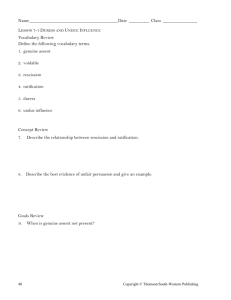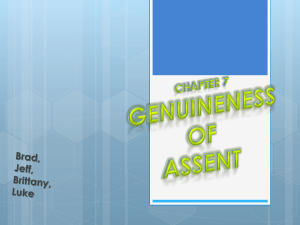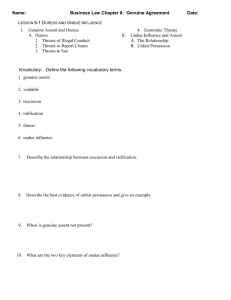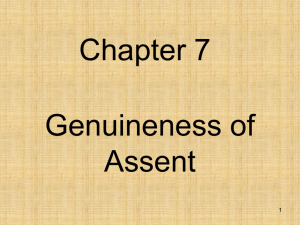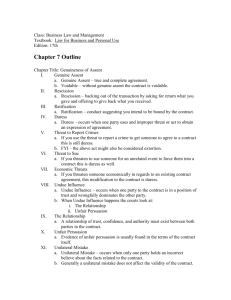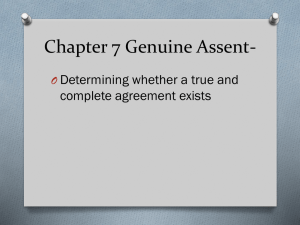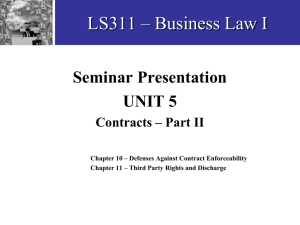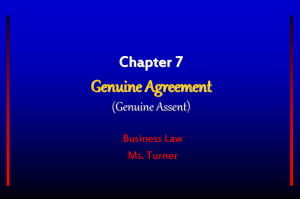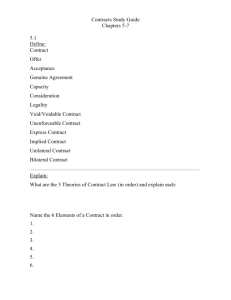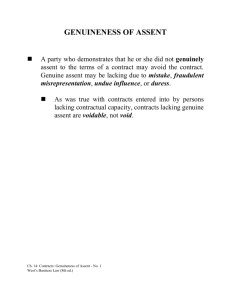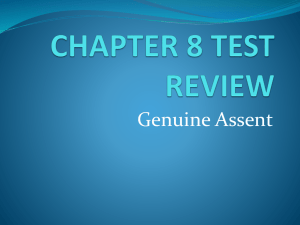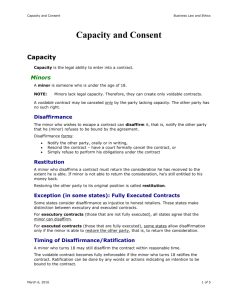Lesson 7-1 Outline Lesson 7
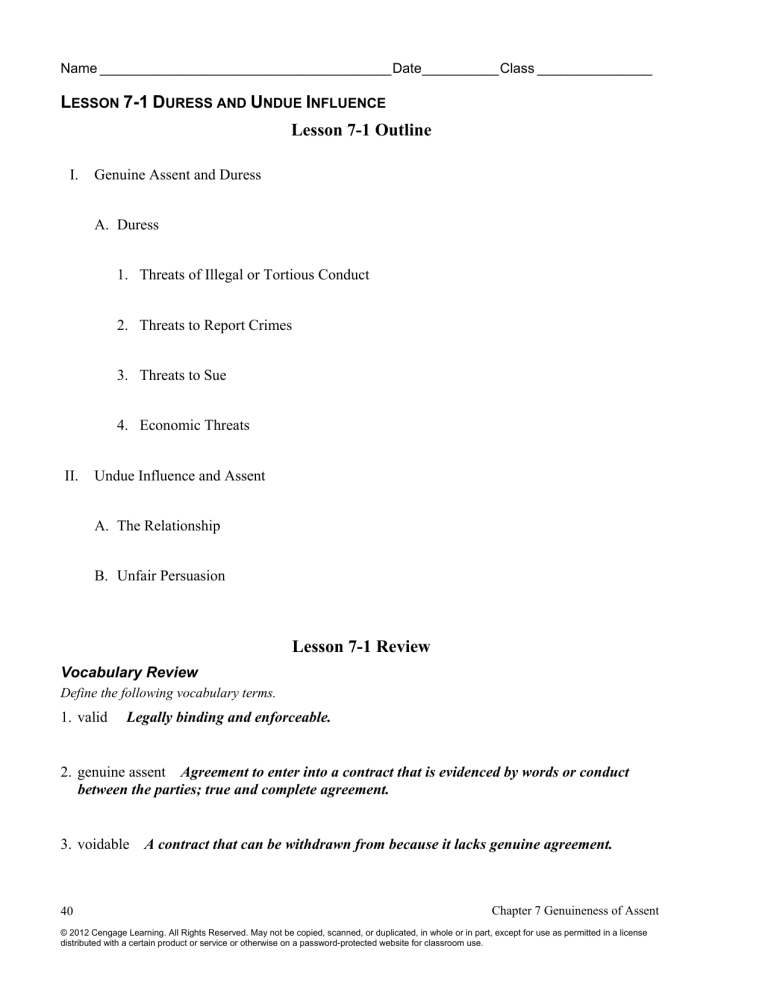
Name ______________________________________Date__________Class _______________
L ESSON 7-1 D URESS AND U NDUE I NFLUENCE
Lesson 7-1 Outline
I. Genuine Assent and Duress
A. Duress
1. Threats of Illegal or Tortious Conduct
2. Threats to Report Crimes
3. Threats to Sue
4. Economic Threats
II. Undue Influence and Assent
A. The Relationship
B. Unfair Persuasion
Lesson 7-1 Review
Vocabulary Review
Define the following vocabulary terms.
1. valid Legally binding and enforceable.
2. genuine assent Agreement to enter into a contract that is evidenced by words or conduct between the parties; true and complete agreement.
3. voidable A contract that can be withdrawn from because it lacks genuine agreement.
40 Chapter 7 Genuineness of Assent
© 2012 Cengage Learning. All Rights Reserved. May not be copied, scanned, or duplicated, in whole or in part, except for use as permitted in a license distributed with a certain product or service or otherwise on a password-protected website for classroom use.
Lesson 7-1 Review (continued)
4. rescission Backing out of a contract by asking for the return of what you gave in the transaction and offering to give back what you have received.
5. ratification Conduct that confirms an intent to be bound by a contract.
6. duress Using an improper threat or act to obtain an expression of agreement.
7. undue influence Occurs when the dominating party to a confidential relationship exerts irresistible pressure on the dominated party to enter into a contract that benefits the former.
Concept Review
8. Describe the relationship between rescission and ratification.
Rescission must be prompt in order to be effective, occurring shortly after it is discovered that there is no genuine agreement. If the injured party exhibits conduct suggesting that the party is bound by the contract, then there is ratification and rescission would be unlikely.
9. Describe the best evidence of unfair persuasion and give an example.
The best evidence of unfair persuasion is when the contract has unfair terms for one of the parties. For example, an orderly in a nursing home might buy the property of one of the for less
Goals Review
10. When is genuine assent not present?
Genuine assent is not present when it is clear that duress, undue influence, mistake, misrepresentation and or fraud has occurred.
11. What are the two key elements of undue influence?
(1) There must be a relationship of trust, confidence, or authority between the parties to the contract. (2) The stronger party must wrongfully dominate the party or use unfair persuasion in order to secure an agreement.
Chapter 7 Genuineness of Assent 41
© 2012 Cengage Learning. All Rights Reserved. May not be copied, scanned, or duplicated, in whole or in part, except for use as permitted in a license distributed with a certain product or service or otherwise on a password-protected website for classroom use.
Name ______________________________________Date__________Class _______________
L ESSON 7-2 M ISTAKE , M ISREPRESENTATION , AND F RAUD
Lesson 7-2 Outline
I. What Are the Types of Contractual mistakes?
II. What Is Misrepresentation?
A. Untrue Statement of Fact
2. Silence
B. Materiality
C. Reasonable Reliance
III. Fraud and Remedies for Fraud
A. The Misrepresentation Must Be Intentional or Reckless
B. The Misrepresentation or Concealment Must Injure
C. Remedies for Fraud
1. Rescission
2. Damages
3. Punitive Damages
42 Chapter 7 Genuineness of Assent
© 2012 Cengage Learning. All Rights Reserved. May not be copied, scanned, or duplicated, in whole or in part, except for use as permitted in a license distributed with a certain product or service or otherwise on a password-protected website for classroom use.
Lesson 7-2 Review
Vocabulary Review
Define each of the following vocabulary terms.
1. unilateral mistake A mistake in which only one party holds an incorrect belief about the facts related to a contract.
2. mutual mistake A mistake in which both parties have an incorrect belief about an important fact.
3.
material facts Important facts that influence the parties’ decisions about a contract.
4. void A contract is void (without legal effect) if a mutual mistake of fact as to the identity of the subject matter of a contract occurs.
5. innocent misrepresentation Party to a contract does not know that a statement he or she made is untrue
6.
fraudulent misrepresentation An untrue statement by a party in a contract that the party knows is untrue.
7.
fraud The tort that occurs when one person intentionally misrepresents an existing important fact thereby causing financial injury.
Concept Review
8. Describe three ways a party may make a unilateral mistake. Do these make a contract voidable?
A party may hold an incorrect belief about the facts related to a contract by failing to read the contract, reading it carelessly, or signing a contract written in language that the party does not understand. Generally such mistakes do not make a contract voidable.
9. What is the difference between an innocent misrepresentation and a fraudulent misrepresentation?
An innocent misrepresentation occurs when the offeror makes a statement that he does not know to be untrue. Fraudulent misrepresentation occurs when the offeror makes a statement that he or she knows to be untrue. In both of these situations the contract would be voidable by the offeree.
10. If there is intentional misrepresentation, but no injury, is there fraud? Can the contract be rescinded? Should it be rescinded?
Without injury there is no fraud. However, misrepresentation may be grounds for rescinding the contract. However, if the contract is still to the advantage of both parties there may be no desire to rescind.
Chapter 7 Genuineness of Assent 43
© 2012 Cengage Learning. All Rights Reserved. May not be copied, scanned, or duplicated, in whole or in part, except for use as permitted in a license distributed with a certain product or service or otherwise on a password-protected website for classroom use.
Lesson 7-2 Review (continued)
Goals Review
11. What kinds of mistakes can make a contract void or voidable?
A unilateral mistake is generally not grounds for voiding a contract, unless the other party is aware of the mistake. However, an induced unilateral mistake is grounds for voiding a contract.
12. Describe the conditions for misrepresentation to occur.
Statements are treated as misrepresentation only if (1) the untrue statement is one of fact or there is active concealment, (2) the statement is material to the transaction or fraudulent, and (3) the victim reasonably relied on the statement.
13. Describe the conditions for fraud to occur.
For fraud to occur the misrepresentation must be intentional or reckless and intended to induce the victim to contract and there must be injury.
44 Chapter 7 Genuineness of Assent
© 2012 Cengage Learning. All Rights Reserved. May not be copied, scanned, or duplicated, in whole or in part, except for use as permitted in a license distributed with a certain product or service or otherwise on a password-protected website for classroom use.
